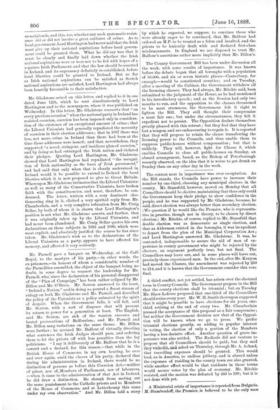Mr. Gladstone seized on this letter, and replied to it
in one dated June 12th, which he sent simultaneously to Lord Hartington and to the newspapers, where it was published on Wednesday. In this letter, Mr. Gladstone reasserts that "on every previous occasion" when the national party in Ireland has resisted coercion, coercion has been imposed only in considera- tion of the existence of an exceptional amount of crime; that the Liberal Unionists had generally repudiated the necessity of coercion in their election addresses ; that in 1887 there was leas, not more, crime in Ireland than there had been at the time those addresses were issued ; and that, nevertheless, they supported "a novel, stringent, and insidious plan of coercion," and by doing so had estranged the Irish nation and violated their pledges. Quoting Lord Hartington, Mr. Gladstone showed that Lord Hartington had repudiated "the recogni- tion of Irish nationality as the basis of Irish government," and had said that only when that is clearly understood in Ireland would it be possible to extend to Ireland the local liberties which it is now proposed to give to Great Britain. Whereupon Mr. Gladstone intimates that the Liberal Unionists, as well as many of the Conservative Unionists, have broken faith with the constituencies, and must, therefore, be con- demned. The letter, written with a very dominant elec- tioneering ring in it, elicited a very spirited reply from Mr. Chamberlain, and a very complete refutation from Mr. Craig Sellar, by both of whom it is shown that Lord Hartington's position is not what Mr. Gladstone asserts, and further, that it was originally taken up by the Liberal Unionists, and had never been abandoned. Mr. Craig Sellar quotes his own declarations on these subjects in 1885 and 1886, which were most explicit, and absolutely justified the course he has since taken. Mr. Gladstone's wish as to the declarations of the Liberal Unionists as a party, appears to have affected his memory, and affected it very seriously.


































 Previous page
Previous page